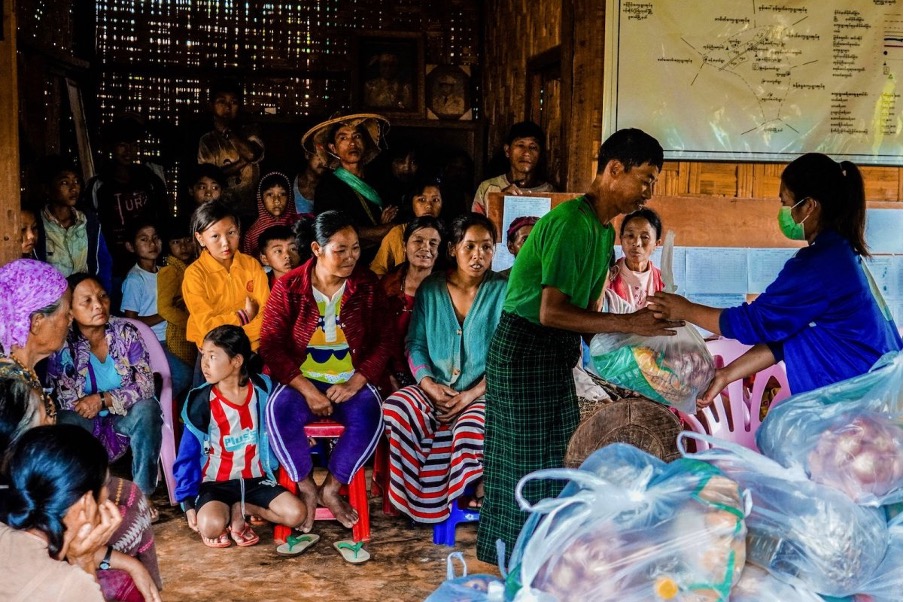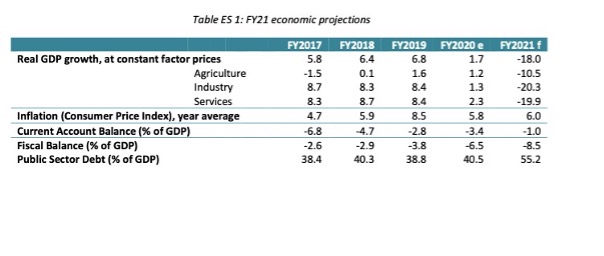Table of Contents
25th July 2021
Myanmar’s economy is set to shrink by 18 percent this fiscal year amid the ongoing political upheaval caused by the military coup and a rapid surge in the third wave of COVID-19 in the country, the World Bank said in its latest report.
The World Bank said the 18 percent contraction in fiscal year 2021 (October 2020-September 2021), coming on top of weak growth in FY2020, “would mean that the country’s economy is around 30 percent smaller than” it would have been in the absence of the pandemic and the military takeover on Feb. 1
In March, the global financial institution forecast that the country’s economy was expected to contract by 10 percent this year as military rule hammered what was one of the region’s fastest-growing economies. However, nearly six months after the military grabbed power, its forecast has changed, with the economy expected to shrink by 18 percent as the country’s political and heath crises have deepened and the prospect of civil war looms.
“Around 1 million jobs could be lost, and many other workers will experience a decline in their incomes due to reduced hours or wages,” the bank said. The share of Myanmar’s population living in poverty is likely to more than double by the beginning of 2022, compared to levels before COVID-19 hit, the bank said.
Myanmar, a least developed country, has made significant achievements in poverty reduction over the last decade. In 2017, Myanmar had a poverty rate of 24.8 percent, down from 48.2 percent in 2005, according to the United Nations.
“The loss of jobs and income and heightened health and food security risks are compounding the welfare challenges faced by the poorest and most vulnerable, including those that were already hit hardest by the pandemic last year,” said Mariam Sherman, World Bank country director for Myanmar, Cambodia, and Laos.

This picture taken on June 12 shows people receiving food donations in the Mong Paw area in Shan state, as fighting has intensified in the region between the military and various ethnic armed groups in eastern Myanmar since the February military coup.
“The military takeover in February immediately impacted an economy that had already been weakened by COVID-19,” the World Bank said.
Since the military takeover, major multi-billion-dollar foreign investment projects have halted, and existing operations are being shelved. As a result, millions of people have lost their jobs and are facing food shortages.
According to the bank, domestic activity and trade have been hit by reduced mobility; protests, security concerns and worker strikes; and the ongoing disruption of critical business services including banking, logistics and telecommunications.
Despite bank branch reopenings and several interventions by the Central Bank of Myanmar, physical currency continues to be in short supply and access to banking and payment services remains limited, the bank said.

The bank’s report said that as of mid-July, the Myanmar kyat had depreciated by around 23 percent against the US dollar since late January, which combined with trade disruptions has led to rapid price increases for some imported products, including fuel. Moreover, farmers have been affected by lower wholesale prices for some crops, higher input prices and limited access to credit, the bank said.
“Taken together, these shocks have weakened consumption, investment and trade, and disrupted businesses’ operations and the supply of labour and inputs,” the bank said.
The current third wave of COVID-19 is posing an immediate threat to lives, livelihoods and the economy, especially given the lack of capacity in the public health system to adequately respond, the World Bank warned.
While testing rates remain limited, extremely high positivity rates among those who have been tested indicate widespread community transmission. Combined with the impact of containment measures and precautionary behaviour, this will amplify Myanmar’s economic challenges, the bank said.
“Over the longer term, recent events have the potential to jeopardize much of the development progress that has been made over the past decade. Significant impacts on investment, human capital accumulation and the environment for doing business are likely to impair prospects for economic growth over the longer term,” it said.
Source The Irrawaddy 26th July 2021.
In an interesting move, China has supplied doses of the Covid vaccine to the KIA to use in the areas of its control. Whether the intent is to administer these to civilians or if it is for the use of the KIA soldiers is a moot point. If it is for the rebel soldiers, it sends a message even though it is a modest quantity. China has reported an outbreak of Covid in a border area, which has probably come from Myanmar. If this outbreak develops into a major outbreak then that will put stress on China’s relations with the Junta.
China has supplied over 10,000 Covid vaccines to the Kachin Independence Army, which operates near China’s southern border, the KIA spokesman said Saturday, as Beijing seeks to halt the influx of cases from Myanmar.
Myanmar has been in turmoil since the military took power in February, with a resurgent virus wave striking with many hospitals empty of pro-democracy medical staff.
The KIA, which has waged a decades-long insurgency in Myanmar’s far north, has received 10,000 vaccines from Yunnan authorities, Col Naw Bu, a spokesperson for KIA told AFP.
“KIA asked help from China, and China gave us help for vaccines,” he said, without specifying which shot the group had been given or when the first batch had arrived.
Some of the shots had been paid for and others were donated, he added, without providing a breakdown.
A surging caseload in Myanmar has spooked authorities across its porous border with China.
Earlier this month, Beijing reported 57 new infections nationwide — the highest daily tally since late January — including fifteen in the city of Ruili, next to Myanmar.
Twelve of those were Myanmar nationals, according to health authorities in Yunnan province.
A batch of 736,000 donated Sinopharm doses also arrived in Yangon Thursday, with Myanmar officials saying residents along the border with China would be given priority.
Beijing enjoys exceptional leverage over Myanmar and has so far refused to label the military action a coup.
Observers say it also maintains alliances with ethnic militias on the long China border, who have been fighting the army for decades.
The KIA has fought sporadically with the government’s forces since the coup.
Source Frontier 26th July 2021.
These developments are worth watching as they could have an impact on the outcome of the Junta’s strategy.
Please share this article so that others can discover The BFD









